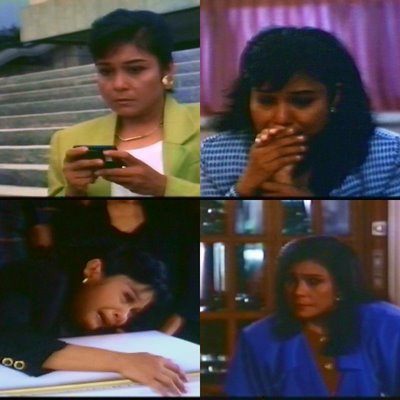
By: Patrick Flores As Published In The Philippine Daily Inquirer December 29, 1993
In one of her letters auctioned recently, Hollywood's recluse par excellence wrote: "I hate the California sunshine."
The sentiment, suffused with chic arrogance and steely dignity, can only evoke the legend woven around Greta Garbo's persona. It can also only soak the substance of tragedy more thoroughly: dreams do die and the sun sometimes cannot share the space even with the most stunning of stars.
The story of Nora Aunor has come to this. Her Cinderella fairy tale has unraveled down to its straggling thread. And the tragedy is more deeply felt now more than ever. The nostalgia for Nora's most flourishing seasons and the almost cultic devotion lavished on her by the most ardent of pilgrims simply, but not crudely, show that somehow Nora is history.
Or is it myth? The very same myth that the tumultuous lives of Gloria Swanson (as Norma Desmond in Sunset Boulevard) and Michael Jackson have spawned and shaped. The very same myth that has wrought the faces of nameless destinies.
As if peculiar to her kind, Nora's life has thrived on as it has preyed on the most complex ironies: how she practically organized mass hysteria at the height of Martial Law, how her political and artistic sensibility sharpened as the Marcoses started to lose their wits, and how her glorious career faded into the sunset as the world turned against the Empire.
Once upon a time, she'd make a movie for maybe three or four days and her multitude would gobble up the gimmick with such passion. With picnic baskets in tow, they would leave their provinces and trek to the city to watch Nora's flick on its first day – all day long. Just as they would patiently wait for the cycle of sowing and reaping to take its course, so would Nora's legion of fans expectantly bear witness to their idol's unfolding and growing larger than life on screen.
We could go on and on talking about the phenomenon, tinkering with the thought that her fate (or is it karma) might have rehearsed the days of our lives: depression, triumph, abuse, corruption, wealth, capitulations, conspiracies, poverty, bad luck, blessings, bloody battles for custody and identity, strained relations with family and children, adventures with body and spirit, addiction to bad habits, apathy, ectopic pregnancies, failed marriages, separations, resounding returns, ominous visits, wayward flights.
Like all of us after a fall, she would always promise to bounce back only to time and again frustrate herself and her friends – both sincere and the mercenary – and buckle down in the face of hostile pressures and changing times.
And so, her failed experiments: In the 90s, Nora started to take up anti-establishment causes, even if people still remembered how she had regaled Marcos loyalists with a soulful rendition of Tina Turner's We Don't Need Another Hero in one of the more celebrated campaign sorties, and how EDSA revelers violently rejected the slippers she was tossing to them during those February vigils.
Still and all, she would star in an anti-bases stage play, sing for Jaime Tadeo's release, and perform worldwide the drama on the diaspora of women's labor. In other words, Nora would shift gears even if it was already too late in the day – something not at all unusual for someone who used to fritter away the imperatives of superstardom in favor of non-formula projects, unpopular gestures towards an ungrateful industry, and die- hard romances with lovers.
Many times in her helter-skelter history, Nora would go out of her way to do "something more" for the audiences who had made and unmade her, for the souls who had selected their own societies – and then shut the door.
And the doors have remained shut. For the past three years, the Superstar's films have been dismal disappointments, box-office wise and in the context of her excellent body of work. In fact, after her golden decades, she could only manage to do films for the Metro Manila Film Festival. Not so much as a Christmas choice, to be sure, but as a business move: only a State-sponsored festival can make sure that theater owners will show her films.
Nora was an NPA amazon in Andrea… Paano Ba Maging Isang Ina and a former japayuki who assists her daughter to die in Ang Totoong Buhay ni Pacita M. In 1992, she was filmless.
Without doubt, the underdog stereotype she has retained, in reel and real life. But her mater dolorosa martyrdom has ceased to serve merely as opium. For Nora's legendary eyes have ostensibly seen the darker, sadder realities being lived everyday by her fans who'd save whatever they could scrape just to watch her pursue their dreams. Nora Aunor cannot renege on her promise.
The era of film royalty, in spite of Regal Films, is over. In the wake of Nida and Gloria, Amalia and Susan, Nora and Vilma, Maricel and Sharon, a new and fierce rivalry has yet to challenge the star-struck imagination of the public. To this we say: The Queen is Dead, Long Live the Queen!
As the fantasia-mania for Nora Aunor, the biggest star and the most competent actress Philippine cinema has ever produced, turns paler and paler every day, vanishing into the mists of myths, our remembrances of turbulent things past, of which Nora was specter, flash not like lightning but like ambulance lights – relentless, nervous, desperate in their intimations of uncertainty.
Catch her today in Inay and love her to death – for sentimental reasons.







0 comments:
Post a Comment